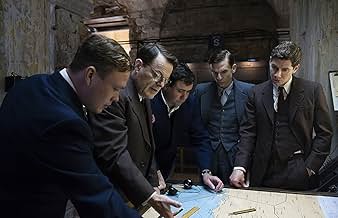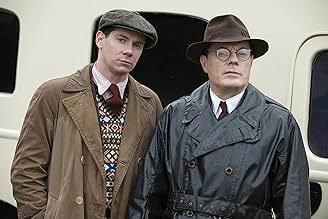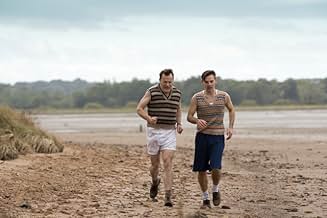IMDb RATING
6.8/10
1.2K
YOUR RATING
Eddie Izzard stars in this funny, moving and inspiring factual drama about the pioneering work on radar by a little known team of scientists in the run up to the Second World War.Eddie Izzard stars in this funny, moving and inspiring factual drama about the pioneering work on radar by a little known team of scientists in the run up to the Second World War.Eddie Izzard stars in this funny, moving and inspiring factual drama about the pioneering work on radar by a little known team of scientists in the run up to the Second World War.
- Awards
- 2 nominations
Neal Stewart-Roxburgh
- The 7th Boffin
- (uncredited)
- Director
- Writer
- All cast & crew
- Production, box office & more at IMDbPro
Storyline
Did you know
- GoofsThe aircraft in the initial test is of the right era but the wrong type - it looks like a de Havilland Rapide, while it should be a Handley Page Heyford, something in which the film makers had little choice, since not a single example of a Heyford survives, flying or not.
Featured review
A local theatre has been showing little-known WW II films this month (August 2015) on the 70th anniversary of the end of that war, and this film on the British development of radar for the RAF prior to WW II was one of them. I'm interested in the historical development of technology plus I had seen a PBS Nova show several years ago on WW II's spur to radar's development, so I was interested in this BBC production. In addition, Ian Kershaw, a well-respected British historian, wrote the script. I was not disappointed; it was a very enjoyable film for me.
I had also seen earlier this year "The Imitation Game" featuring Alan Turing and his team of British mathematicians and codebreakers at Bletchley Park, and the parallels with "Castles" are striking. Both films have groups of unconventional geniuses monitored by class-conscious representatives of Britain's ruling circles and sequestered in rural hideaways where they work under great pressure to help win the war ("Imitation") or prepare for war ("Castles"). Robert Watson Watt, played by Eddie Izzard, is the Alan Turing of "Castles", and although not as eccentric as Turing, is sufficiently unconventional to warrant suspicion and doubt by those in the British government in the late-30s who must trust him with their scarce resources. His idea is to use a series of radio beams: (1) of sufficient strength to echo off incoming objects, e.g., bombers, at a sufficient distance, (2) and of sufficient number to ascertain their direction. The senior officials want him to use the nation's top physicists from Oxford and Cambridge to assist him, but Watt is an engineer for the Meteorological Service and wants to use his fellow "weather engineers" who can think outside-the-box. He gets his way against the rigid class structure of pre-war Britain, and for my money the visible drama of demonstrating radar's efficacy in detecting planes from 60 miles out (as shown in "Castles") is more striking than the drama that unfolds in "Imitation" where the group is finally able to read a coded message. The end of "Castles" shows how well radar has been integrated into RAF's Fighter Command by taking us inside their command centers that are ready to scramble fighters at the first ping on the radarscope on the eve of the Battle of Britain (when the Luftwaffe had three times as many planes at the outset).
Modern wars, for better or worse, are said to be won with economic production and technology, and it's thus gratifying to see little-known figures like Watt featured in a film like this. It's sad to compare, however, that Watt was rewarded with a knighthood in 1942 for his pre-war development of radar, while Turing, pledged to secrecy by the British government for his war-time codebreaking, was not honored during his lifetime and apparently committed suicide.
I had also seen earlier this year "The Imitation Game" featuring Alan Turing and his team of British mathematicians and codebreakers at Bletchley Park, and the parallels with "Castles" are striking. Both films have groups of unconventional geniuses monitored by class-conscious representatives of Britain's ruling circles and sequestered in rural hideaways where they work under great pressure to help win the war ("Imitation") or prepare for war ("Castles"). Robert Watson Watt, played by Eddie Izzard, is the Alan Turing of "Castles", and although not as eccentric as Turing, is sufficiently unconventional to warrant suspicion and doubt by those in the British government in the late-30s who must trust him with their scarce resources. His idea is to use a series of radio beams: (1) of sufficient strength to echo off incoming objects, e.g., bombers, at a sufficient distance, (2) and of sufficient number to ascertain their direction. The senior officials want him to use the nation's top physicists from Oxford and Cambridge to assist him, but Watt is an engineer for the Meteorological Service and wants to use his fellow "weather engineers" who can think outside-the-box. He gets his way against the rigid class structure of pre-war Britain, and for my money the visible drama of demonstrating radar's efficacy in detecting planes from 60 miles out (as shown in "Castles") is more striking than the drama that unfolds in "Imitation" where the group is finally able to read a coded message. The end of "Castles" shows how well radar has been integrated into RAF's Fighter Command by taking us inside their command centers that are ready to scramble fighters at the first ping on the radarscope on the eve of the Battle of Britain (when the Luftwaffe had three times as many planes at the outset).
Modern wars, for better or worse, are said to be won with economic production and technology, and it's thus gratifying to see little-known figures like Watt featured in a film like this. It's sad to compare, however, that Watt was rewarded with a knighthood in 1942 for his pre-war development of radar, while Turing, pledged to secrecy by the British government for his war-time codebreaking, was not honored during his lifetime and apparently committed suicide.
Details
- Runtime1 hour 30 minutes
- Color
Contribute to this page
Suggest an edit or add missing content



















